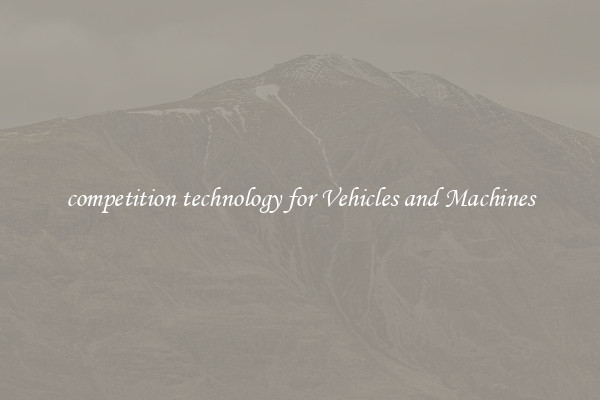competition technology for Vehicles and Machines
Competition in the technology industry is fierce, and this is especially true for vehicles and machines. The relentless drive to innovate has transformed the way we live, work, and travel. From self-driving cars to state-of-the-art heavy machinery, manufacturers are continuously pushing the boundaries to develop cutting-edge technologies that are safer, more efficient, and more intelligent.

One of the most notable advancements in vehicle technology is the rise of electric vehicles (EVs). The advent of EVs has disrupted the automotive industry and shifted the focus towards sustainable transportation solutions. As a result, major car manufacturers like Tesla, Nissan, and General Motors are engaged in intense competition to develop the most advanced electric vehicles that offer longer range, faster charging times, and improved battery technology.
Additionally, autonomous driving technology has become a significant area of competition. Companies such as Google, Uber, and Waymo are locked in a race to develop fully autonomous cars that can navigate the roads without human intervention. This technology promises to revolutionize the transportation industry by reducing accidents, improving traffic flow, and enhancing overall efficiency. The competition in this sector has resulted in significant technological advancements and has pushed companies to invest in research and development to gain a competitive edge.
In the heavy machinery industry, competition has spurred the development of advanced technologies that improve productivity and efficiency. Excavators, bulldozers, and other construction equipment have become increasingly sophisticated, equipped with GPS systems, telematics, and sensors that enhance precision and reduce downtime. Companies like Caterpillar and Komatsu are continuously competing to introduce the latest technology that can perform tasks more efficiently, save fuel, and minimize environmental impact.
The rise of the Internet of Things (IoT) has also contributed to the competitive landscape for vehicles and machines. By connecting machines and vehicles to the internet, companies can collect valuable data to optimize performance, monitor maintenance needs, and even enhance safety features. This technology allows for real-time monitoring and predictive analysis, ensuring that vehicles and machines operate at maximum capacity and minimizing unexpected breakdowns or accidents.
Furthermore, the competition in the technology sector extends to the development of alternative fuels and energy sources. As concerns over climate change and pollution increase, there is a growing demand for vehicles and machines that utilize renewable energy. Companies are striving to develop efficient and cost-effective solutions, such as hydrogen fuel cells and biofuels, to power their products. This competition has accelerated the pace of innovation in the energy sector, inspiring breakthroughs that have the potential to change the way we power vehicles and machines in the future.
In conclusion, competition in the technology industry for vehicles and machines is driving innovation and transforming industries. The race for more advanced electric vehicles, autonomous driving technology, and IoT connectivity is shaping the future of transportation. Meanwhile, heavy machinery manufacturers are using technology to improve productivity, efficiency, and environmental sustainability. As the battle for supremacy continues, consumers can look forward to safer, more intelligent, and more sustainable vehicles and machines.

View details

View details

View details

View details







